The Levels Of Horror in Kek-W and Dave Kendall’s ‘Fall Of Deadworld’
18th October 2021
The third volume of the acclaimed Fall of Deadworld series is out now! Kek-W (Indigo Prime) and Dave Kendall (Magic the Gathering) continue their new vision of the rise of the Dark Judges in a lavish hardback collection, including never seen before concept art and sketches.
Continuing our series of short essays commissioned from selected comics critics that explore 2000 AD and the Treasury of British Comics’ latest graphic novel collections, Ritesh Babu explores how, with its themes of chaos, doom, and decay, the Fall of Deadworld speaks to our present moment.
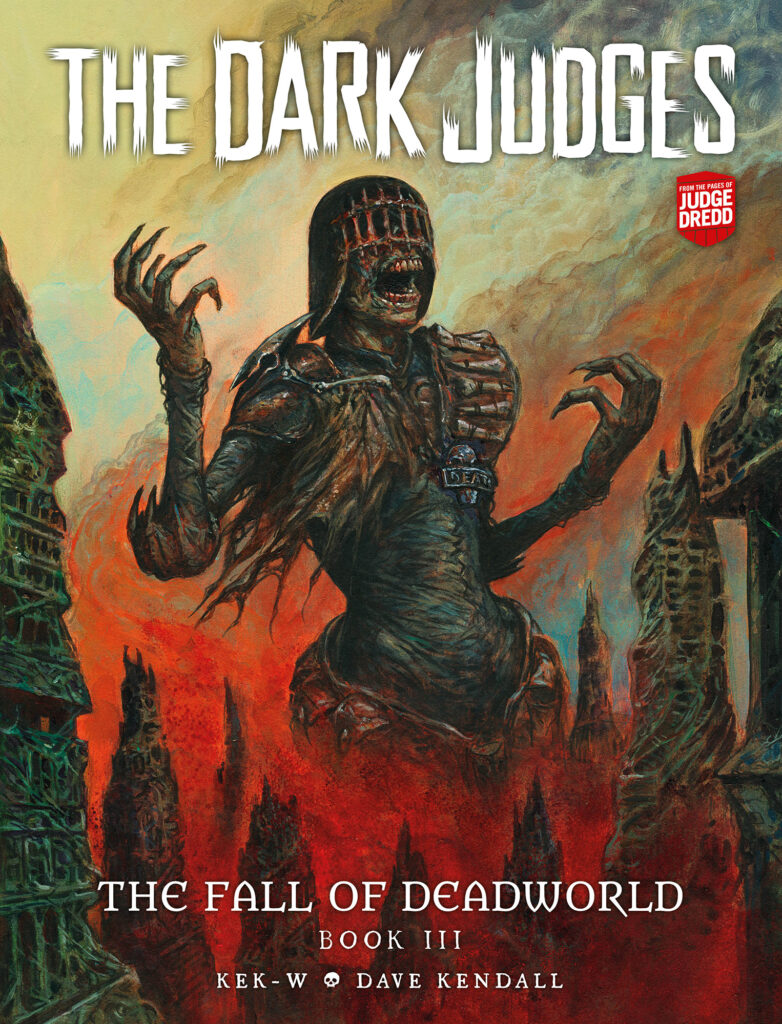
The world of Judge Dredd just isn’t the same without The Dark Judges. The four horsemen of the apocalypse envisioned so long ago by John Wagner, Alan Grant, and Brian Bolland are the definitive antagonists of the enterprise. From their striking silhouettes to their conceptual potential, they’re a powerful presence in any comic they star in.
They bring a sense of weight with them, as you see artist after artist recreate designs that are Bolland’s magnum opus. They underline the ultimate scathing truth about the fascistic policing structures and systems we’re stuck with by granting us operatic characters who embody its natural extremity: Life itself is a Crime. And it must be Punished. Its ludicrousness delivering home a point that’s impossible to miss.
But also, as fixtures of Judge Dredd, as iconic figures of the mythology going back over 30+ years, readers know what to expect from a story starring The Dark Judges. It’s an inevitability, as part of becoming iconic is forging expectations among readership. You’re familiarized with the beats, having seen Judge Anderson and Dredd take them down. You know at the end of the day that Dredd and Mega City-One must persist, for the Galaxy’s Greatest Comic must go on! There is, thus, a sort of safety-net there, as The Dark Judges can never truly ‘win’ and deliver on their fundamental promise, the promise of sentencing all life in the world to death. It must always be avoided.
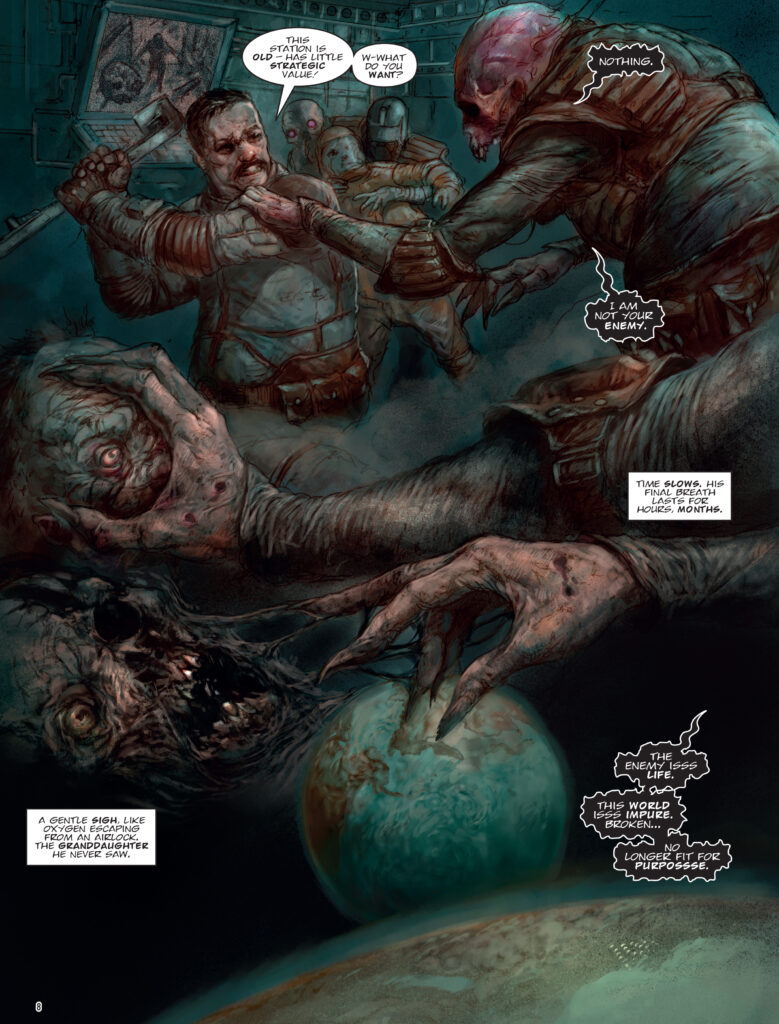
Kek-W and Dave Kendall’s Fall Of Deadworld is a series that circumvents this struggle entirely by being a prequel set in a different world entirely, charting the course of the horrific Deadworld that had to die to give rise to our Dark Judges. Here, too, the audience knows the inevitable conclusion, but rather than that being one of safety and assurance, it becomes one of dread. Deadworld cannot live, it will not survive. You know this horrific fact, and you are forced to watch these people, life itself, struggle against this. The absolute victory that never comes in regular Dredd tales is an inevitability in Deadworld, and that grants it a special potency that is both hard to come by, and also perfectly suited to a horror story.
And that’s what this is. Kendall’s an artist who takes the aesthetics of Dredd and plunges them down an even deeper pit of operatic maximalist horror that etches every possible detail of life it can. Kendall’s His figures have dimension, they have weight, you see sinew tear and blood flow, and thus the presence and power of death itself is rendered far more potent. And Kek-W writes to that, playing to the gory, chilling visions that Kendall excels with. It’s what makes this book almost akin to watching a slow decomposition, as you see life leaving something. (It will not surprise readers to know that Kendall is also a Warhammer 40k artist.)
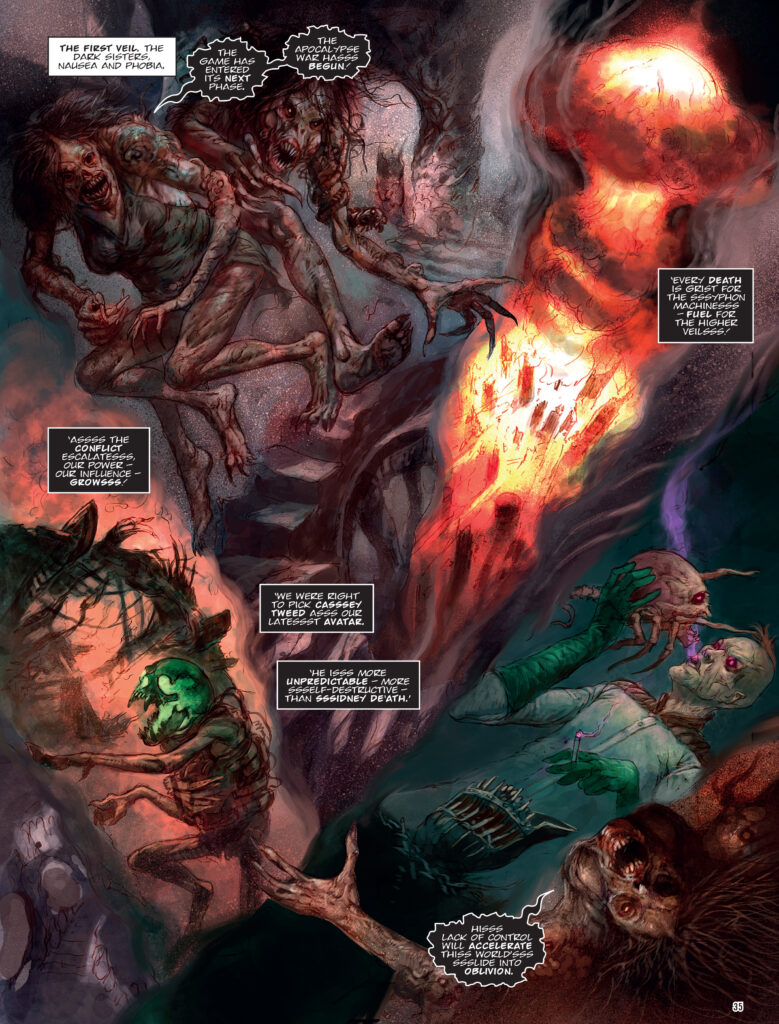
But it only really works because of precise framing. If most Dark Judge tales have them at their heights, Deadworld avoids that. These four aren’t quite there yet. It’s not an origin story for them (though we explore their pasts) but it’s about the final stage before they truly morphed into the ultimate antagonists who eliminated all of life. That means they have shreds of humanity left in them, in ways their iconic selves do not.
Judge Death cannot let go of his bond with his father. Judge Fear has performance anxiety when someone actually stands up to him. Judge Fire is in love and must learn to let go. Judge Mortis is jaded, struck with a deep and corrosive ennui. All of these are ironic hurdles for the Dark Judges to overcome and conflicts for them to wrestle with until they finally become who they’re bound to be. That’s something incredibly unique to what W/Kendall are doing here, particularly in this third volume, joined by letterers extraordinaire Annie Parkhouse and Simon Bowland. And there is a special kind of layer here, as one witnesses The Dark Judges granted these touches of humanity.
But this treatment alone wouldn’t quite have made the series click in the way it does. The real reason it works is it eliminates a key component of the typical Dredd/Dark Judges story – the protagonist is not Dredd or Anderson or a hypercompetent Judge. While it is a sprawling epic of a story, it is one centering upon a little girl named Jess Childs. Judge Fairfax, who seems like he will be the pivotal protector of the girl across the whole story, is immediately taken out of that role, and Jess must fend for herself volume after volume, leading a revolution to save the world.
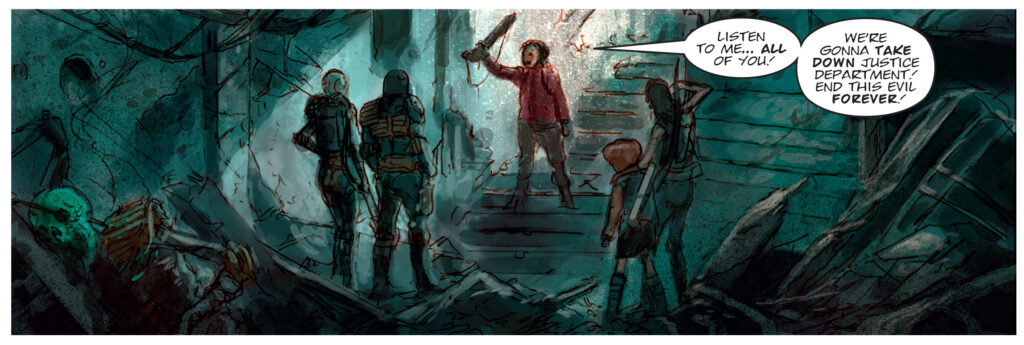
This is where Deadworld mines its potency. At the end of the world, as everything’s going to hell, the prophesied, put-upon savior and champion is…a poor, traumatized little child who is forced to kill. The typical Chosen One narratives of genre fiction become wretched here, as you watch a poor little girl’s innocence shattered, forced into becoming something she never should have had to. The burdens we put on our youth to save our world, our future, even as we’ve doomed it all, even as it may perhaps be too late, that’s what one sees in Jess Childs, and it’s devastating. Even more so when viewed through the clear political context of this work about America and American power’s place in a dying world.
Here you have an America that’s been sold away, divided and destroyed from the inside, by President Boone, who is a Russian tool, which is what leads to and allows The Justice Department run by The Dark Judges to be where it is. That this is a text of the Trump era is obvious, as the team shows us the ex-President obsessing over his golf even in Russia, while being a puppet of Putin. We even get Judge Mortis talking about manipulation of truth itself, which is absolutely keyed into this moment we’re in.
But that little girls like Jess must bear the burden of bringing about salvation for us all, for the errors and horrific impulses of the old guard, of the powerful? That they don’t even get to live, they don’t get to grieve, but must pick up what they can from the carcasses of their parents to go and try to salvage and ‘save’ the world, which is falling apart due to its monstrous masters? That’s a far more chilling and striking horror story than the kind possible with Dredd at the center.
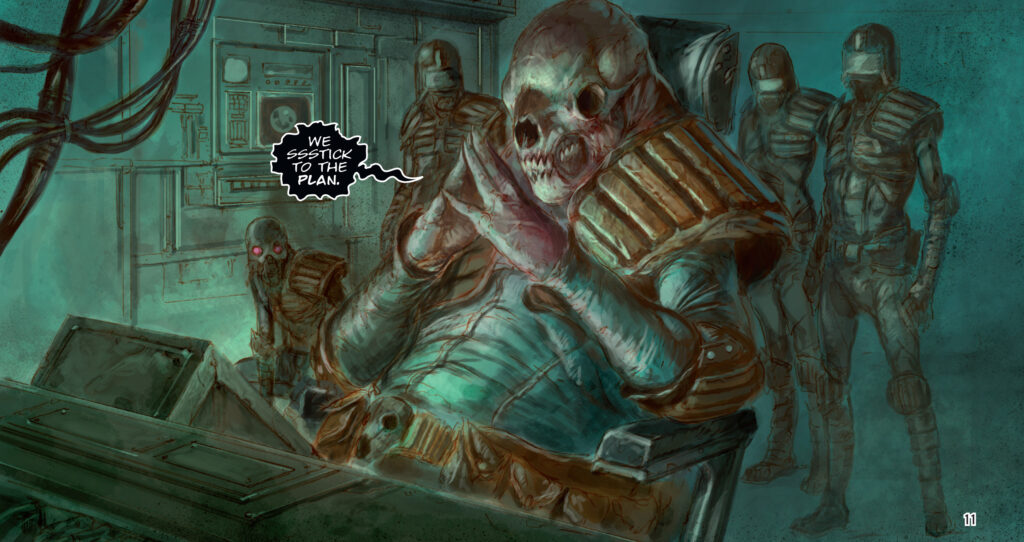
Ritesh Babu is a freelance writer and comics critic whose work has appeared in outlets such as Panel x Panel, Shelfdust, ComicBookHerald, and many more. He has far too many thoughts on The British Invasion, and can be found obsessing over comics history over at @riteshwriter on Twitter.
All opinions expressed in this article are the author’s own and do not necessarily represent the opinions of Rebellion, its owners, or its employees.
